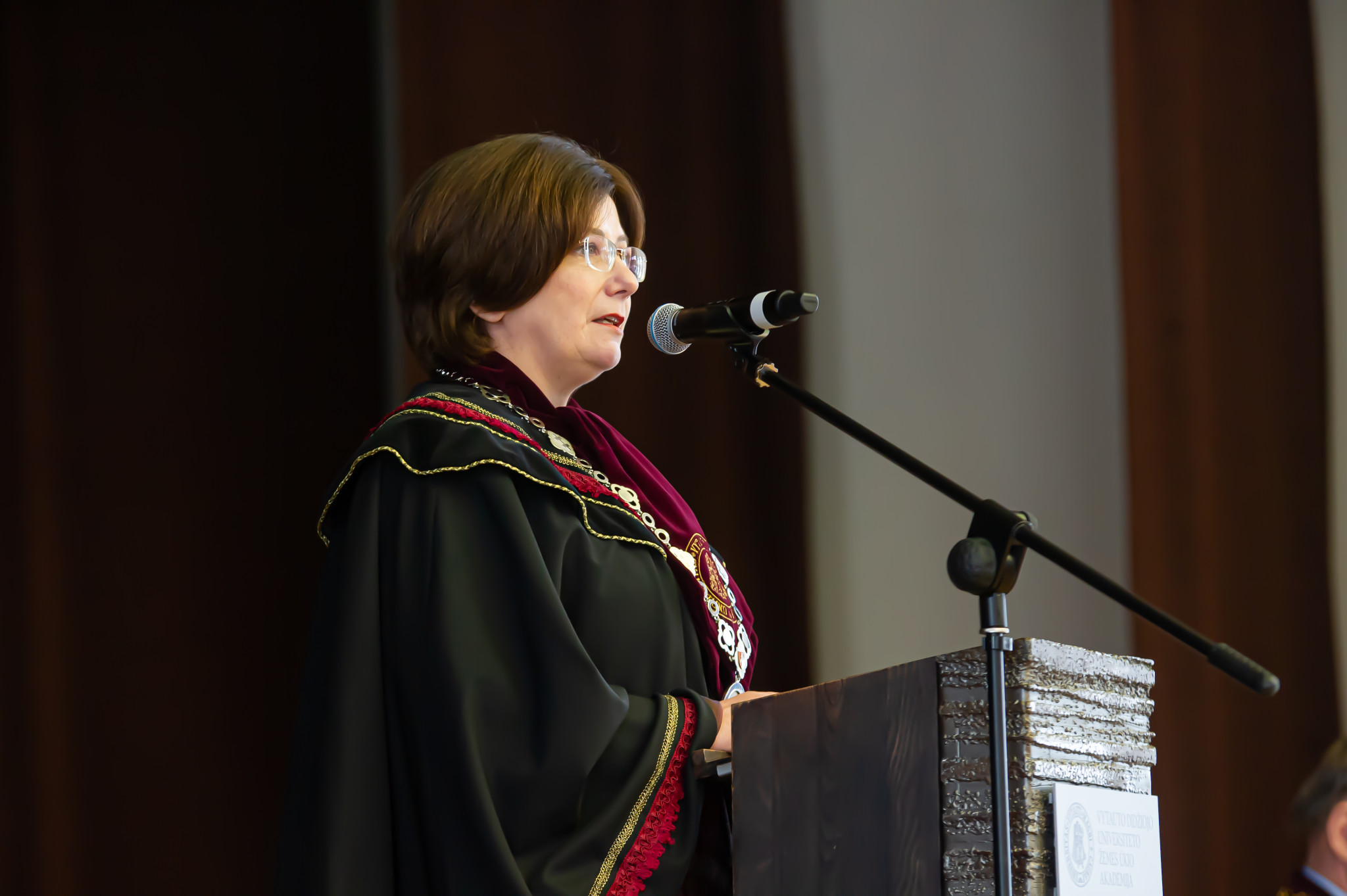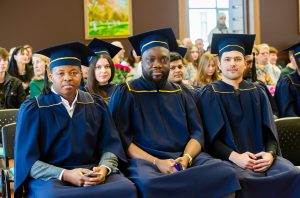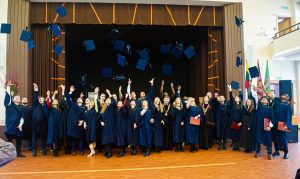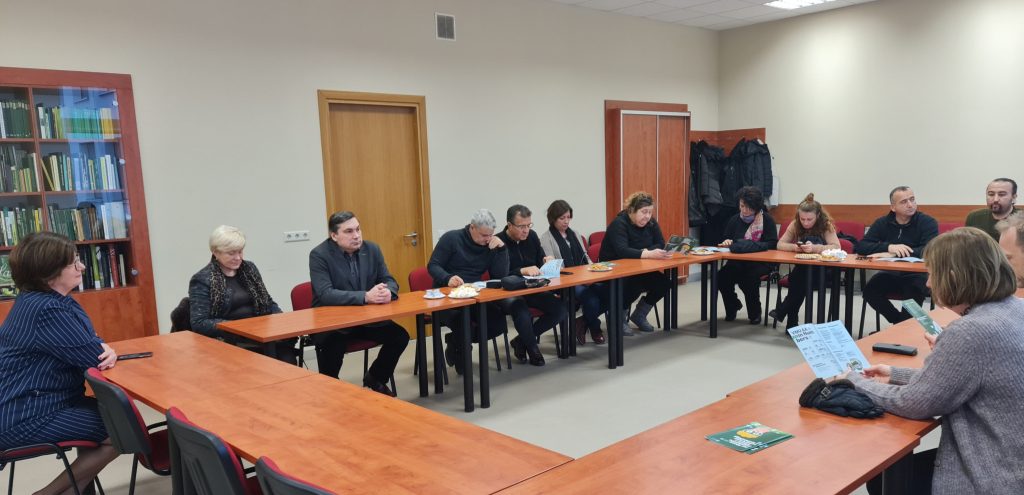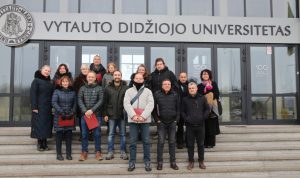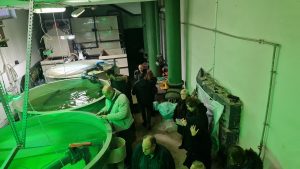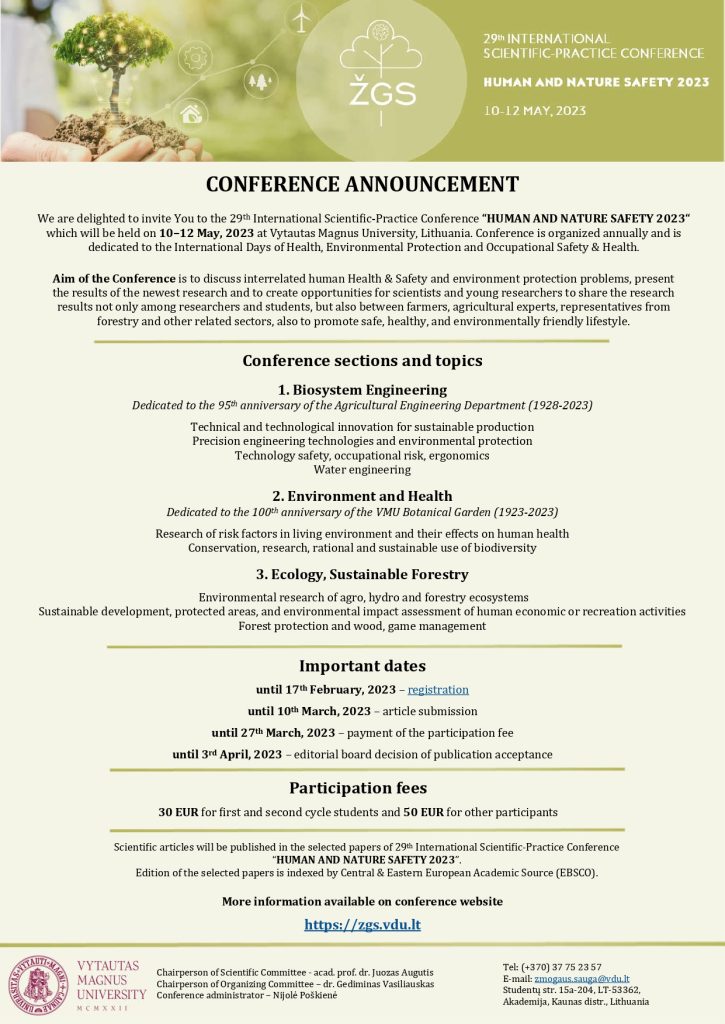Erasmus+ Traineeship Competition for All World Countries. Turn the Adventure into an Experience!
A competition is open for Erasmus+ student or recent graduate traineeship grants for traineeships in any country in the world. Application deadline is the 28th of February, 2023.
The placement period is from 2 to 6 months. Recent graduate traineeship must end – in a year after graduation.
Selection
All VMU full-time degree students who have not used more than 10 months of their Erasmus mobility (study/traineeship) period are eligible for the Erasmus grant.
Selection documents
For student traineeship (traineeship during student’s year of studies):
- Filled-in application form „Outgoing-Application for Erasmus Student Traineeship“
- Confirmation by the company or organization (obligatory).
Documents must be submitted online.
For recent graduate traineeship (application must be submitted during the last year of studies):
- Application form „Outgoing-Application for Erasmus Recent Graduate Traineeship“
- Confirmation by the company or organization (obligatory);
- Recommendation by a faculty member (obligatory).
The priority in the selection is given to:
- students whom traineeship is an obligatory part of their study programme;
- students who have never been Erasmus traineeship students before.
Selection criteria:
- student’s motivation;
- good knowledge of the language which will be used during the traineeship;
- student’s work, study, traineeship, participation in the international/academic projects, social activities experience in Lithuania and abroad;
- conformability between the chosen traineeship and student’s study programme;
- study results (first year MA students should attach transcript of records of their BA/MA degree to the application form).
Traineeship grants:
For EU and EEA countries:
| Country group | Country | Monthly scholarship size |
| Group I | Denmark, Finland, Iceland, Ireland, Luxembourg, Sweden, United Kingdom, Liechtenstein, Norway | 700,00 Eur |
| Group II | Austria, Belgium, ,Germany, France, Italy, Greece, Spain, Cyprus, Netherlands, Malta, Portugal | 670,00 Eur |
| Group III | Bulgaria, Croatia, Czech Republic, Estonia, Latvia, Lithuania, Hungary, Poland, Romania, Serbia, Slovakia, Slovenia, North Macedonia, Turkey | 600,00 Eur |
| Group IV | Switzerland | 700,00 Eur |
For Non-EU/EEA countries:
Scholarship is 700,00 Eur/month.
Travel grant (depends on the distance between sending and receiving institutions):
- 100-499 km – 180,00 Eur
- 500-1999 km – 275,00 Eur
- 2000-2999 km – 360,00 Eur
- 3000-3999 km – 530,00 Eur
- 4000-7999 km – 820,00 Eur
- More than 8000 km – 1500,00 Eur
Additional travel grants for green travelling options.
The competition results will be sent to every participant via e-mail.
More information:
Join VMU Arts and Sports Centre Activities
Students of Vytautas Magnus University are invited to register and join the art and/or sports activities organised by VMU Sports and Arts Centres in the spring semester of 2022/2023.
All students of VMU, regardless of where and what they are studying (e.g., if you are studying Public Communication, you can join the folk music band “Ūkininkas” of VMU Agriculture Academy).
The activities are free of charge for VMU students, and university alumni are also welcome to join in. You can register for several activities, so you are welcome to join the activities offered by VMU and get actively involved in the activities of the Sports and Arts Centres.
Registration for art activities
REGISTRATION: Students who wish to act, dance, sing or play must join one (or several) of the VMU Arts Centre groups based in Kaunas, Akademija (Kaunas district) or Vilnius. You can do this by registering for the ongoing activities by following three steps:
- should log in to the student self-service portal and select the Registration tab from the menu bar;
- in the bar that appears, click on the button Registration for the Sports/Arts Centre;
- then select Arts and in this section, you need to select the desired arts activity, tick it and click on the Continue button and click on the I agree to the rules and the REGISTER button.
The student will see the classes of the sports he/she has registered for in the student portal, under My activities. You can also withdraw from the selected activities in the student portal.
Once you have registered for a group at the Arts Centre, you can start attending activities as soon as possible, at the times indicated in the group’s timetable.
Registration for Sports activities
You can start attending sports activities as soon as possible, at the times indicated in the group’s timetable.
REGISTRATION: All VMU students who want to participate in sports at the VMU Sports Centre facilities (Studentų str. 11 and Studentų str. 9A, Akademija, Kaunas district) can register for the sports activity classes.
Students wishing to register for VMU Sports Centre activity classes should log in to the student self-service portal and select the Registration tab from the menu. In the bar that appears, click on the button Registration for the Sports/Arts Centre. In the next step of the Activity Registration select Sport. In this section, you need to select the desired sport, tick it and click on the Continue button and click on the I agree to the rules and the REGISTER button.
The student will see the classes of the sports he/she has registered for in the student portal, under My activities. You can also withdraw from the selected activities in the student portal.
More information:
- VMU Sports centre
- Address Studentų str. 9A, Akademija, Kaunas district
- Phone (8 37) 752 251, 8652 39195 (only during working hours)
- E-mail sporto.centras@vdu.lt
- Facebook VDU Sports
- Instagram vduni.sports
Graduation diplomas were awarded to graduates of the VMU AA Faculty of Bioeconomy Development
On January 27 at Vytautas Magnus University Agriculture Academy (VMU AA), a group of graduates of the Faculty of Bioeconomy Development were ceremoniously awarded with diplomas of graduation from bachelor’s and master’s studies. During the ceremony, the representatives of VMU and VMU AA administration, teachers, social partners and relatives wished the young professionals starting a new phase of life a successful career path. Those leaving the Alma Mater spared the words of thanks to all those who raised them, gave them knowledge and showed them the right direction in life.
The Rector of VMU, prof. habil. dr. Juozas Augutis said that he has no doubt that a successful university graduation opens the way for young professionals to seek new knowledge. “In today’s world, we cannot talk about the end of studies, because Europe, the world, the social environment, technologies are changing very rapidly. Therefore, learning new things and a new approach is and will be necessary all the time. It is really impossible to learn everything that future work and life will require just in the year of study”, – said the rector, noting that in the current demographic situation, the state needs youth more than ever.
According to the rector, young people today do not have the luxury of postponing jobs for the future. “Let’s roll up our sleeves and go to work in Lithuania”, – prof. dr. J. Augutis quoted the founders of the state of Lithuania in 1918, wishing success to the graduates who acquired the professions most necessary for creating the future of a sustainable state at the Faculty of Bioeconomy at VMU AA.
Congratulating the graduates on the occasion of graduation, the chancellor of the VMU Agriculture Academy, prof. dr. Astrida Miceikienė said that graduating from university is one of the most wonderful events in a person’s life. “A degree or diploma is not just a document. It is an acknowledgment that hard work has paid off and you can fly into the future on the wings of science. This is an amazing academic achievement! A diploma is your ticket to better opportunities, so cherish it”, – wished the chancellor, inviting the graduates to return to the university for master’s and doctoral studies and to become active members of the graduate club “ŽŪA alumni”.
The dean of the Faculty of Bioeconomy Development, assoc. prof. dr. Bernardas Vaznonis, social partner of VMU AA UAB “Kesko Senukai Lithuania” infrastructure director, commander of 208 Kaišiadorių rifle company Algirdas Grybauskas, president of VMU Students’ Representative Council Ieva Vengrovskaja wished the graduates the courage to take responsibility and a successful career.
On behalf of the graduates, Ikbol Makhsumov, a graduate of the Logistics and Commerce study program, thanked the teachers, VMU AA administration staff and fellow students for the encouragement, support and meaningful time spent together. He said that the year of study was a wonderful, challenging journey that provided great opportunities for self-realization. The graduate of VMU AA said that no one else can follow his path than a person himself. However, a person makes his own decisions about which way to go. “So everyone have a good trip!”, – wished I. Makhsumov to his fellow students.
Open Competition for University Fee Exemptions for Spring Semester
Vytautas Magnus University (VMU) has launched an open competition for university fee exemptions for spring semester of the academic year 2022/2023. The purpose of the competition is to achieve the mission of socially responsible university by reducing social exclusion, creating appropriate financial conditions for VMU students to be accommodated and (or) study (taking into account different social (material) situations, study results and (or) accommodation in the dormitory).
University fee exemptions for spring semester 2022/2023 may be granted at a rate of up to 100 % to cover:
TUITION FEES, and this exemption may be granted for students of a full-time bachelor, master, or integrated studies:
- who are currently in a difficult social (financial) situation;
- whose grades (taking into account credits) average for the last examination session (for first-year students – entrance competition score) is not lower than 8 (eight).
ACCOMMODATION FEES, and this exemption may be granted for students of a full-time bachelor, master, PhD or integrated studies, who are currently living in the dormitory of VMU and who have concluded Agreement for Accommodation, based on:
- social (financial) situation;
- dormitory and room type, where student is being accommodated (NOTE: students, who are currently living in a single-bedroom of the dormitory cannot be awarded accommodation fee exemption).
University fee exemptions through the open competition may be awarded as a matter of priority, by taking into account social (financial) status, for:
- orphans, students who were granted custody or guardianship until adulthood or who have lost both of their parents (both of the parents have passed away);
- students with disabilities;
- students from the families with large number of children (there are four or more children in the family, who are currently students, school pupils or minors).
Given the social (material) status, students must provide following documents for the competition:
- orphans: original documents of the death certificates of your mother and father, with official translations to Lithuanian, English or Russian languages with the translator’s stamp attached;
- students with disabilities: original document, which proves your disability with official translations to Lithuanian, English or Russian languages with the translator’s stamp attached;
- students from the families with large number of children:
- original certificate of family composition with official translations to Lithuanian, English or Russian languages with the translator’s stamp attached;
- original documents / certificates from kindergartens/schools/universities and others education institutions which proves student or school pupil status with official translations to Lithuanian, English or Russian languages with the translator’s stamp attached.
Students who are willing to apply for free exemptions, has to complete an electronic application form in Student self-service portal. How to do this?
- log in to the VMU Student self-service portal using your personal login provided by the University;
- select the Applications in the menu box and click on the Requests button;
- select the application category Fees exemptions and compensations, click Tuition / Accommodation fee exemption by the means of competition (form F-006), complete the form, attach (upload) documents, which prove social (financial) status of the family, together with official translations to Lithuanian, English or Russian languages with the translator’s stamps attached and submit it.
Applications are open from January 30th, 2023, to February 19th, 2023. Results of the open competition will be published by March 1st, 2023, by personally informing students about it by an email being sent to the VMU email address.
Tuition fee and accommodation fees exemptions shall be awarded by taking into account all the support granted for the student by VMU, awarded scholarships, granted exemptions and (or) size of the fees paid for the University and given the support and (or) scholarships awarded from the State budget funds, private legal or natural persons.
More information:
VMU AA students and employees have the opportunity to listen to the study subject “Econometrics” (Prof. Dr. Vesa Niskanen, Finland)
In the spring semester, the study subject “Econometrics” will be taught remotely to foreign bachelor students at the Faculty of Bioeconomy Development of Vytautas Magnus University Agricultural Academy (VDU AA). The lecturer is professor dr. Vesa Niskanen, University of Helsinki, Finland.
We invite VDU AA students and employees to listen to this study subject.
Lectures and exercises will be held on Fridays in a non-auditory environment: lectures at 11:15 a.m. to 12:45 p.m., exercises at 1:00 p.m. to 2:30 p.m.
The study subject “Econometrics” is free of charge for VMU employees. Registration is required when filling out the application.
Contact:
VMU AA study administration coordinator
doc. dr. Rasa Čingienė
Phone +370 682 22 874
E-mail rasa.cingiene@vdu.lt
11th International Scientific Conference “Rural Development 2023: Bioeconomy for The Green Deal”
We kindly invite You to the 11th International Scientific Conference “RURAL DEVELOPMENT 2023: Bioeconomy for the Green Deal”, which will take place in Vytautas Magnus University Agriculture Academy (Lithuania), 26-28 September, 2023.
This conference is aimed at providing interdisciplinary scientific discussion, presenting new ideas for rural development processes in the context of Bioeconomy, Climate Change, Innovations and Social Progress.
The main topics of Conference sessions:
- Agro-innovations and Food Technologies;
- Biosystems Engineering and Environmental Integrity;
- Multifunctional Approach for Sustainable Use of Bio-Resources;
- Social Research for Sustainable Bioeconomy and Climate Change.
Business and Science Forum “Connecting the Dots: A Roadmap for Lithuanian Bioeconomy Development” will be held during the Conference.
Conference keywords: Innovations, Integrity, Bio-resources, Well-being.
Important dates and deadlines:
- Until September 15th, 2023 – registration (extended)
- Until September 26th, 2023 – article submission (extended)
- Until September 10th, 2023 – payment of participation fee
- January, 2024 – publishing of the Conference proceedings
| Participation fee | In person (EUR) | Online (EUR) |
| Authors until August 27th | 250 | 170 |
| Authors after August 27th | 300 | 220 |
| PhD students | 125 | 100 |
| Non-authors | 150 | Free of charge |
Participation fee in person covers not only the Conference proceedings, but also coffee breaks, lunches and gala dinner. The costs of accommodation, cultural (social) programme and transport should be covered by the participants of the Conference.
Speakers of the conference pay the participation fee after receiving information about the confirmation of the topic of the presentation.
Certificates of participants will be sent by e-mail after the conference.
More information about the Conference
Online Registration on the Conference website.
Information for authors.
New design, more user-friendly Conference website: https://www.ruraldevelopment.lt/
Conference e-mail: rural.development@vdu.lt
 This Conference starts a cycle of events dedicated to the 100th anniversary of the Vytautas Magnus University Agriculture Academy.
This Conference starts a cycle of events dedicated to the 100th anniversary of the Vytautas Magnus University Agriculture Academy.
The second international meeting of partners of Erasmus+ project MARIPET was held at VMU Agriculture Academy
Over three billion people depend on marine and coastal biodiversity for their livelihoods. However, today we are seeing 30 percent of the world’s fish stocks overexploited. FAO estimates that total fish production is 179 million tonnes in 2018 and about 88 % of the mentioned amount was utilized for human consumption directly and the rest (12 %) was described as used for “non-food purposes” and “waste”. Reducing by-catch and discard is an important issue for fishery management. Not only ecological impacts on biodiversity but also economical losses are enormously tragic problems worldwide. More than 40 fish species are caught per operation in bottom-trawl fishing, especially in Mediterranean waters because of its multi-species fishery characteristics. Among these, species that are discarded for various reasons besides those that are evaluated commercially have a significant amount in the total catch. A large proportion of fisheries production (35 percent of the global harvest) is either lost or wasted.
For this, it is aimed to provide training on the possibilities of using discarded fishery products as pet food by bringing them to shore. MARIPET project intends to create an awareness to use discard products by captured-based fisheries into the pet food industry. Although fish meal and fish oil which are the most valuable feed ingredients in the fish feed industry have been produced by using discarded fishes, it needs still a huge amount of investment to create economically valuable products. By contrast, most of the discarded fishes can be used as “Biologically Appropriate Raw Food” (BARF).
The barf diet is obtained by blending foods that are useful and nutritious for cats and dogs in certain proportions. It means biologically suitable raw foods which is a diet that has been formulated considering the diet of cats and dogs in their evolutionary process. The main theme of MARIPET includes more than one value chain step from the marine environment to pet food plant and any single step can create a difference itself. an innovative 5-module training programme, a virtual dedicated environment with an online education kit, platforms for discard fisheries and pet food trainers/experts and pet food manufacturers/experts, and an e-book/guidebook on European Discard Fisheries and Pet Food Production will be developed. The training workshops and multiplier events in five countries will finalise the project activities.
The project was launched on February 28, 2022. On January 10-11, 2023 the second international meeting of project partners was held at Vytautas Magnus University (VMU). Project implementation issues and the creation of training programme modules were covered during the meeting.
The meeting participants visited the Aquaculture Centre at the VMU Agriculture Academy, where the centre’s director, lecturer Alvydas Žibas introduced the technologies used here, the scientific research being conducted, the fish species being cultivated, the daily challenges that arise, and expressed satisfaction with the centre’s accomplishments. The project’s achievements were reviewed with the chancellor of the VMU Agriculture Academy prof. dr. Astrida Miceikienė and the dean of the Faculty of Forestry and Ecology prof. dr. Vitas Marozas. The possibility of collaboration in arranging studies and performing scientific research was also addressed.
Tadas Laurinavičius, head of company “Baltic Facility Management’s” aquarium maintenance, introduced the project participants to the aquarium housed in PLC “Mega”. It is the largest and tallest aquarium in the Baltic countries and it is ranked in the top ten in the world. The aquarium is 10 metres high and 4 metres wide, with a length of 11 metres and a water capacity of 170,000 gallons. With more than 10 tonnes of salt dissolved in it, the aquarium maintains an average water temperature of 25 degrees Celsius. Computer systems maintain water quality and temperature. The aquarium is home to around 170 tropical fish species from the Atlantic, Indian, and Pacific Oceans, as well as the Red, Mediterranean, and Caribbean seas. Participants had many questions about assuring fish viability, nutrition, well-being, cohabitation, and ecological functioning. The quarantine system built in the aquarium’s technical premises, which is used for the acclimation of new fish and the treatment of ill ones, as well as technological gadgets that maintain the life of the aquarium’s residents, piqued the curiosity of project participants.
The project is coordinated by Ege University (Turkey). Project partners: University of Balikesir (Turkey), University of Dubrovnik (Croatia), Agricultural University of Iceland, Izmir Metropolitan Municipality (Turkey), Norwegian University of Science and Technology, and Vytautas Magnus University.
The project’s next meeting will be held at Dubrovnik University (Croatia) in June 2023.
The project will last until February 28, 2024.
VMU AA Autumn Intake 2023/2024 is open. Apply now!
Would like to gain strong knowledge, solid skills, and invaluable international experience? Thinking about an unforgettable European student adventure and traveling the world?
Top-quality studies in a high-ranking university and living in Kaunas – located in the center of Europe – may be the perfect combination for You.
Your lifetime adventure can start now. With VMU Agriculture Academy.
Autumn Intake 2023/2024 study programmes:
- Accounting and Finance / Учет и Финансы (BA)
- Bioeconomy Business Management (BA)
- Logistics and Commerce (BA)
- Agri-Food Business Management (MA)
- Business Logistics (MA)
- Customs Process Management (MBA)
Application deadlines:
- June 1 – for applicants from non-EU/EFTA countries that do not have Lithuanian Embassies in their countries
- July 1 – for applicants that are not required to obtain a national visa for arrival to Lithuania, as well as for non-EU/EFTA applicants with Lithuanian Embassies in their home countries
Information about Application and Admission Procedures
Information about Scholarships
Contact person: VMU Agriculture Academy International Coordinator Ekaterina Makrickiene ekaterina.makrickiene@vdu.lt +370 37 752 386
More information about VMU Agriculture Academy study programmes
VMU Agriculture Academy graduation ceremony
On 27 January 11 a.m., Vytautas Magnus University Agriculture Academy (VMU AA) invites graduates to participate in festive graduation ceremony.
Diplomas will be awarded to graduates of the Faculty of Bioeconomy Development.
The festive ceremony will take place in the festive hall of the VMU Agricultural Academy (Studentų str. 11, Akademija, Kaunas district).
The event will be photographed and/or filmed; therefore, please note that you might be featured in photos or videos which can be published in various media.
International scientific-practice conference “Human and Nature Safety 2023”
We are delighted to invite You to participate in the 29th international scientific-practice conference “Human and Nature Safety 2023″ organized by Vytautas Magnus University which will be held on 10-12 May, 2023. Conference “Human and Nature Safety” is organized annually on occasion of the International Days of Health, Environmental Protection and Occupational Safety & Health.
The aim of the conference is to discuss interrelated problems of human health and safety, the development of various technological innovations, environmental issues, to disseminate state-of-the-art research knowledge and to create opportunities for scientists and young researchers to share the research results not only among researchers and students, but also for professionals in agriculture and forestry, environmental and health sciences and other fields emphasizing the importance of human safety and environmental protection.
Conference sections:
- Biosystem Engineering (11th May):
dedicated to the 95th anniversary of the Agricultural Engineering Department (1928-2023)
– technical and technological innovation for sustainable production;
– precision engineering technologies and environmental protection;
– technology safety, occupational risk, ergonomics;
– Water engineering.
- Environment and Health (10th May):
dedicated to the 100th anniversary of the VMU Botanical Garden (1923-2023)
– research of risk factors in living environment and their effects on human health;
– conservation, research, rational and sustainable use of biodiversity.
- Ecology, Sustainable Forestry (11th May):
– environmental research of agro, hydro and forestry ecosystems;
– sustainable development, protected areas, environmental impact of human activities;
– silviculture, forest protection and multi-purpose use, recreational forestry;
– hunting research, management of wild animal populations.
Conference seminars:
- Value of Medicinal (Aromatic) Plants in Traditional, Scientific and Applied Aspects (10th May);
- Human for Nature, Nature for Human: the Experience of Dzūkija National Park (12th May).
Registration to the conference is active till 17th, February, 2023.
The submission deadline for scientific articles is 10th, March. Scientific articles will be published in the selected papers of the International Scientific-Practice Conference “Human and Nature Safety”, indexed in the Central & Eastern European Academic Source (EBSCO) database.
Contacts:
Vytautas Magnus University
Studentų street 15a-204, LT-53362, Akademija, Kaunas district
Chairperson of the organizing committee
Gediminas Vasiliauskas
Phone +370 689 77015
Conference administrator
Nijolė Poškienė
Phone +370 37 752357
Conference e-mail: zmogaus.sauga@vdu.lt
Conference events might be filmed and / or photographed and you can be seen in the photos or videos of the event, which can be posted on various media.
- About
- About Agri-Food BM programme
- Academic infrastructure units
- All events
- All news
- Aquaculture center
- Archives
- Biosystems Engineering
- Center of Animal husbandry selections, breeding values and dissemination
- Centre of Biosystems Engineering, Biomass Energetics and Water Engineering
- Circular Biobased Economy
- Climate change
- Contacts
- Contacts
- Events
- Events archive
- Faculties
- For business and society
- Innovative products
- International Cooperation
- International projects
- Joint Research Centre of Agriculture and Forestry
- Journal “Human and Nature Safety”
- Laboratory of Technology Safety
- Laboratory services
- Living Environment
- More labs
- News
- Project
- QUALS project description
- Research
- Research areas
- Scientific events
- Scope
- Sitemap
- Studies
- Study programmes
- Technology Transfer & Commercialization
- THE ROLE OF ORGANISATION IN THE PROJECT
- THE ROLE OF ORGANISATION IN THE PROJECT
- THE ROLE OF ORGANISATION IN THE PROJECT
- The Study Process
- Žemės ūkio žinių ir inovacijų sistemos klasteris






